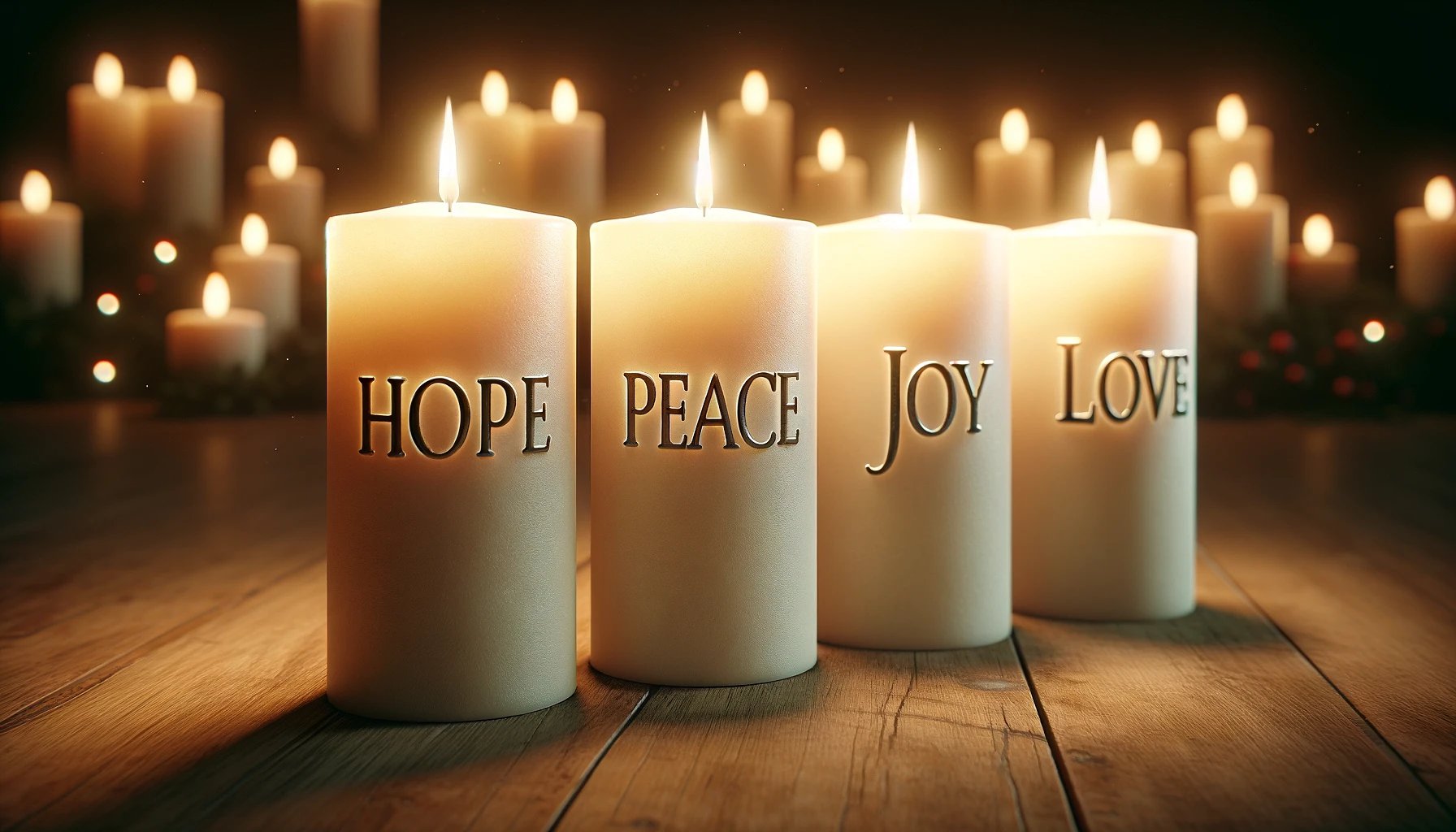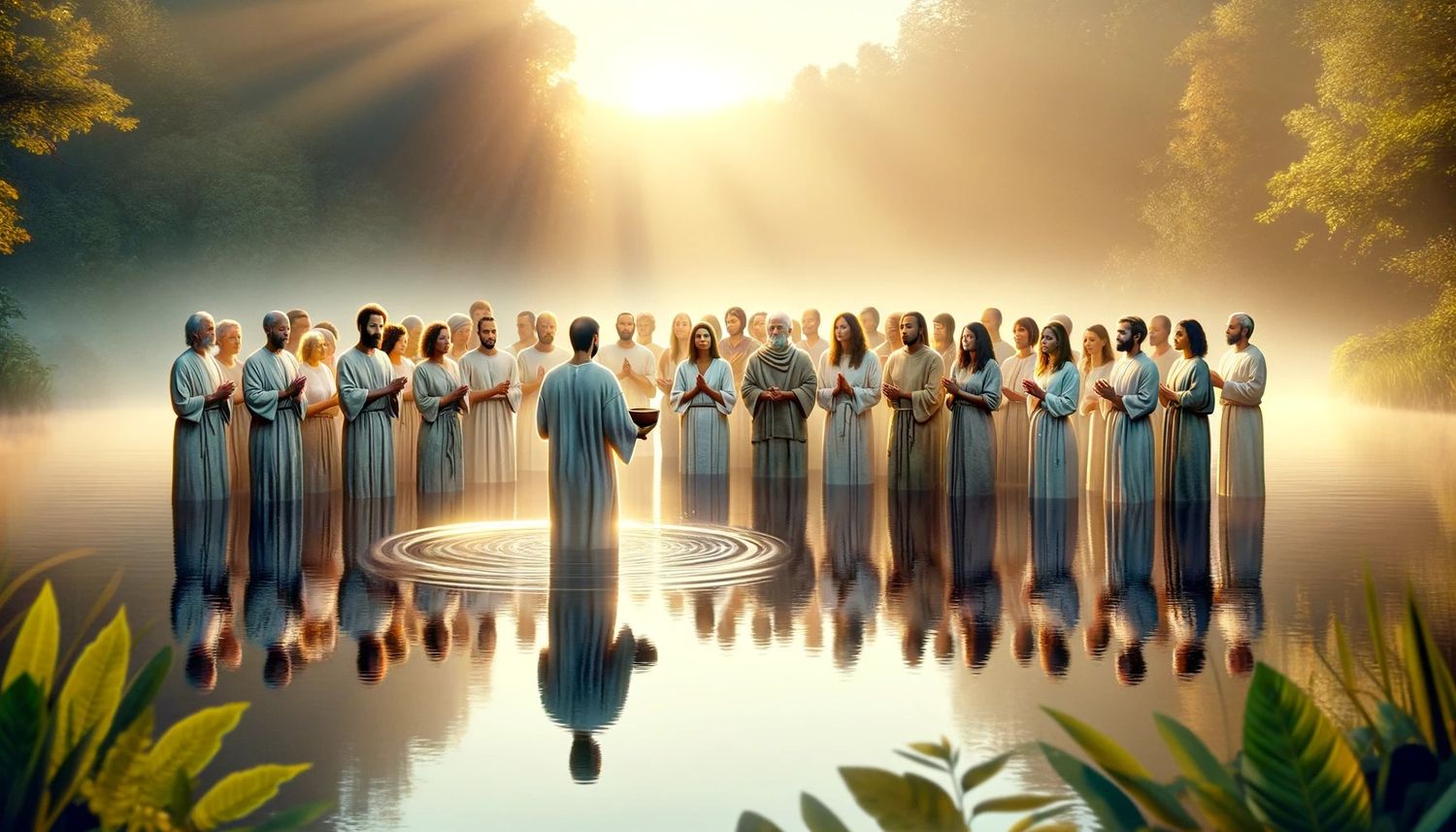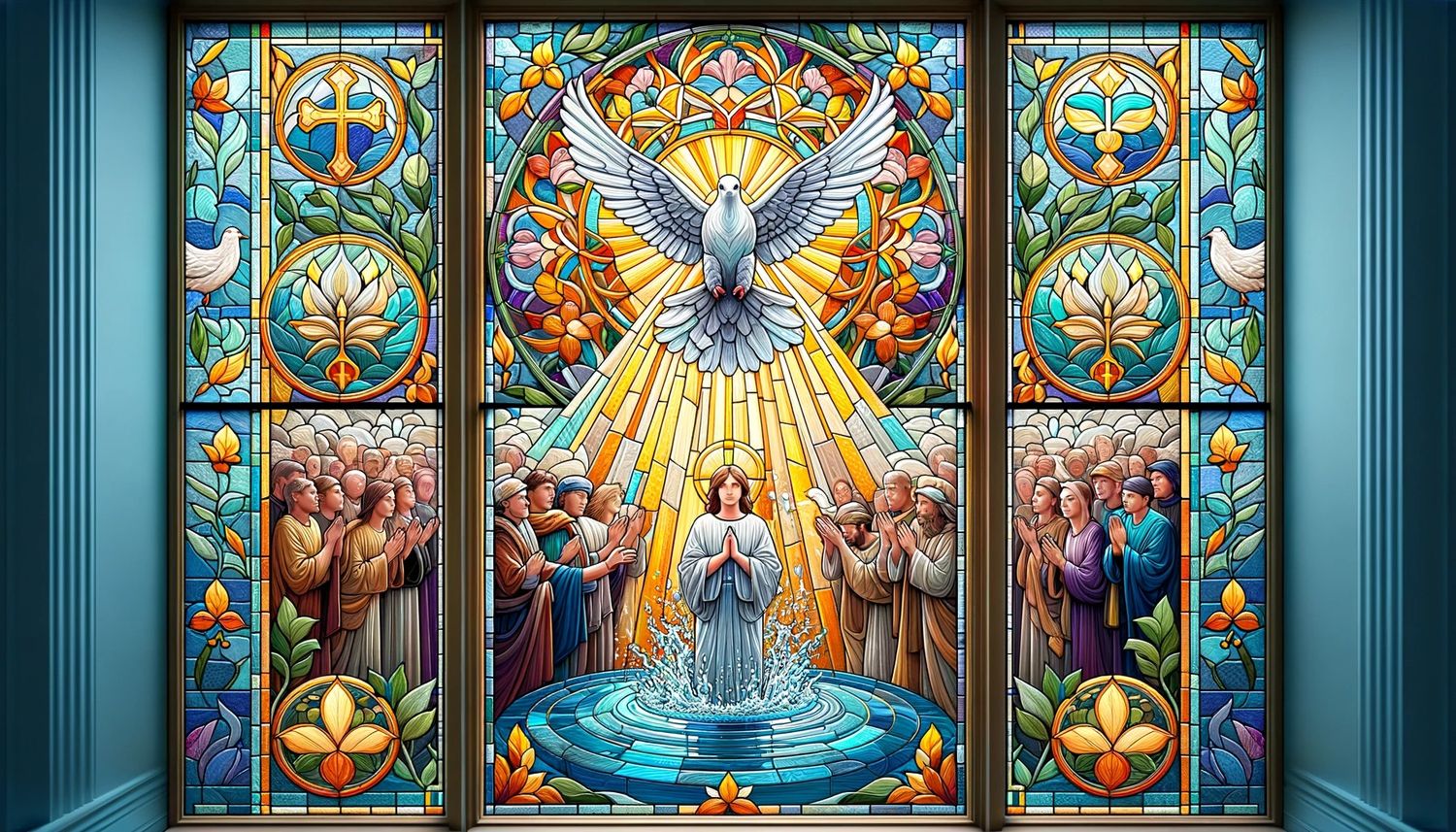Home>Theology and Spirituality>How To Celebrate A Baptism


Theology and Spirituality
How To Celebrate A Baptism
Published: February 26, 2024
Ericka Andersen, an editor at Christian.net, expertly merges digital strategy with content creation, focusing on faith and societal issues. Her communication skills enhance the platform's engaging narratives, fostering meaningful dialogue on belief's impact on society.
Discover meaningful and spiritual ways to celebrate a baptism with our comprehensive guide. Explore the theology and spirituality behind this sacred event.
(Many of the links in this article redirect to a specific reviewed product. Your purchase of these products through affiliate links helps to generate commission for Christian.net, at no extra cost. Learn more)
Table of Contents
- Understanding the Significance of Baptism
- Choosing the Right Venue for the Celebration
- Planning the Baptism Ceremony
- Selecting Godparents and Involving Family Members
- Organizing a Meaningful Reception
- Incorporating Religious Traditions and Customs
- Creating Personalized Baptism Keepsakes
- Sending Out Invitations and Thank You Notes
- Capturing the Memories with Photography and Videography
- Reflecting on the Spiritual Journey Ahead
Understanding the Significance of Baptism
Baptism is a sacred and meaningful rite of passage in many religious traditions, symbolizing the initiation into the faith community. It is a symbolic act of purification and rebirth, representing the washing away of sin and the beginning of a new life in Christ. The significance of baptism lies in its spiritual and religious importance, as it marks the acceptance and inclusion of an individual into the church or religious community. It is a deeply symbolic and profound ceremony that holds great significance for both the individual being baptized and the community of believers.
-
Symbol of Cleansing: Baptism is often seen as a symbolic cleansing of the soul, where the individual is purified from sin and welcomed into the faith community. This act of purification is a powerful symbol of spiritual renewal and rebirth, signifying a fresh start in the individual's journey of faith.
-
Initiation into the Faith: Baptism serves as an initiation into the Christian faith, marking the beginning of the individual's spiritual journey as a member of the church. It is a public declaration of one's commitment to the teachings and beliefs of the faith, and a recognition of the individual's place within the larger community of believers.
-
Connection to Tradition: Baptism also connects the individual to the rich traditions and history of the religious community. It is a link to the past, present, and future of the faith, as the individual becomes part of a lineage of believers who have undergone the same sacred ritual throughout history.
-
Expression of Faith: For many, baptism is a deeply personal and profound expression of their faith and devotion to God. It is a public declaration of one's belief in the teachings of the religion and a commitment to living a life guided by those principles.
-
Sacramental Act: In some Christian traditions, baptism is considered a sacrament, a visible sign of God's grace and a means of receiving spiritual blessings. It is believed to impart divine grace and mark the individual as a member of the body of Christ.
Understanding the significance of baptism is essential in planning and celebrating this important milestone in the life of an individual and the faith community. It is a deeply meaningful and spiritual event that holds great importance for those involved, and its significance should be honored and respected in the planning and execution of the baptism celebration.
Read more: How Is Advent Celebrated In Mexico
Choosing the Right Venue for the Celebration
When it comes to celebrating a baptism, choosing the right venue is crucial in creating a meaningful and memorable experience for the individual being baptized and their loved ones. The venue sets the tone for the entire celebration and plays a significant role in the overall experience. Here are some important considerations when selecting the perfect venue for a baptism celebration:
-
Place of Worship: Many families choose to have the baptism ceremony take place at their local place of worship, such as a church, cathedral, or chapel. This allows for a deeply spiritual and reverent setting, where the sacrament of baptism can be administered within the sacred walls of the faith community.
-
Outdoor Settings: For those who prefer a more natural and scenic backdrop, outdoor venues such as gardens, parks, or waterfront locations can provide a beautiful and serene setting for the baptism ceremony. The connection to nature can add a sense of tranquility and symbolism to the event.
-
Private Residences: Hosting the celebration at a private residence, such as a home or backyard, can create a warm and intimate atmosphere for the baptism. It allows for a personal touch and a sense of familiarity, making the celebration feel more like a family gathering.
-
Community Centers or Event Spaces: Larger gatherings may require a spacious and versatile venue, such as a community center, banquet hall, or event space. These venues offer the flexibility to accommodate a larger number of guests and provide the necessary facilities for hosting a reception or post-ceremony gathering.
-
Historical or Cultural Sites: Some families may opt for a venue with historical or cultural significance, such as a museum, heritage site, or cultural center. These venues can add a unique and meaningful element to the celebration, connecting the baptism to a broader cultural or historical context.
-
Considerations for Accessibility: When choosing a venue, it's important to consider the accessibility and convenience for the guests, especially those with mobility challenges. Selecting a venue with ample parking, wheelchair access, and proximity to public transportation can ensure that all guests can participate in the celebration.
-
Reflecting the Family's Values: Ultimately, the choice of venue should reflect the values and preferences of the family and align with the significance they attribute to the baptism. Whether it's a traditional church setting, a natural outdoor location, or a more contemporary event space, the venue should resonate with the family's vision for the celebration.
Choosing the right venue for a baptism celebration involves thoughtful consideration of the spiritual, practical, and personal aspects of the event. By selecting a venue that aligns with the family's values and provides a meaningful setting for the baptism ceremony and subsequent celebration, the event can be a truly special and memorable occasion for all involved.
Planning the Baptism Ceremony
Planning the baptism ceremony involves careful consideration of the various elements that contribute to a meaningful and reverent experience for the individual being baptized, their family, and the faith community. From the order of service to the selection of readings and prayers, each aspect of the ceremony plays a significant role in honoring the sacred nature of the occasion. Here are key considerations for planning a baptism ceremony that reflects the spiritual significance of the rite:
-
Consultation with Religious Leaders: Before planning the ceremony, it is essential to consult with the religious leaders or officiants who will be presiding over the baptism. They can provide guidance on the specific rituals, traditions, and requirements associated with the baptism within the particular faith tradition.
-
Selection of Scripture Readings and Prayers: Choosing appropriate scripture readings and prayers is a fundamental aspect of the baptism ceremony. These selections often reflect themes of cleansing, rebirth, and spiritual dedication, and they contribute to the overall message and significance of the ceremony.
-
Incorporation of Symbolic Rituals: Many baptism ceremonies include symbolic rituals, such as the pouring of water, anointing with oil, or the lighting of candles. These rituals hold deep spiritual symbolism and are integral to the sacramental nature of the baptism.
-
Musical Accompaniment: Selecting hymns, chants, or instrumental music that resonate with the themes of baptism can enhance the spiritual atmosphere of the ceremony. Music has the power to evoke emotions and create a sense of reverence and awe.
-
Personalization and Customization: Families may wish to personalize the ceremony by incorporating meaningful traditions or cultural elements that hold significance for them. This can add a personal touch to the ceremony and deepen its emotional impact.
-
Logistics and Timing: Planning the logistics of the ceremony, including the timing, seating arrangements, and any special accommodations, is crucial to ensuring a smooth and organized event. Attention to detail in these practical aspects can contribute to the overall flow and solemnity of the ceremony.
-
Rehearsal and Coordination: Conducting a rehearsal of the ceremony, if possible, can help ensure that all participants, including the clergy, parents, godparents, and any others involved, understand their roles and the sequence of events.
-
Documentation and Certificates: It is important to arrange for the necessary documentation and certificates associated with the baptism, as these serve as official records of the sacrament and may be required for future reference.
By thoughtfully planning the baptism ceremony with attention to these key elements, families can create a deeply meaningful and spiritually enriching experience that honors the sacred significance of the rite of baptism.
Selecting Godparents and Involving Family Members
Selecting godparents and involving family members in the baptism celebration is a significant aspect of the event, as it reflects the communal nature of the faith community and provides a support system for the individual being baptized. Here are important considerations for selecting godparents and involving family members in the baptism:
-
Choosing Godparents: The selection of godparents is a crucial decision, as they are entrusted with the spiritual guidance and support of the baptized individual. When choosing godparents, it is important to consider individuals who are committed to their faith, willing to take an active role in the child's spiritual upbringing, and who can serve as positive role models.
-
Spiritual Qualities: Godparents should embody the spiritual values and beliefs of the faith community, as they are expected to support the child in their religious education and moral development. Their own commitment to the faith and their ability to impart wisdom and guidance are essential qualities to consider.
-
Personal Relationship: The godparents should have a close and meaningful relationship with the child and their family. This bond fosters a sense of trust, love, and connection, allowing the godparents to play a significant role in the child's life.
-
Involving Family Members: In addition to selecting godparents, involving family members in the baptism celebration can create a sense of unity and support within the family. Family members can participate in various aspects of the ceremony, such as readings, prayers, or symbolic rituals, contributing to the overall significance of the event.
-
Honoring Traditions: Many families choose to involve grandparents, aunts, uncles, or other relatives in the baptism ceremony, honoring the familial bonds and traditions that hold deep meaning for the family. This involvement can create a sense of continuity and connection across generations.
-
Support Network: Involving family members in the baptism not only enriches the experience for the individual being baptized but also establishes a support network within the family that is committed to nurturing the child's spiritual growth and well-being.
-
Shared Responsibilities: By involving family members in the baptism, the responsibilities of guiding and supporting the child in their faith journey are shared among a network of caring and devoted individuals, reinforcing the communal nature of the faith community.
Selecting godparents and involving family members in the baptism celebration is a deeply meaningful and significant aspect of the event, as it establishes a network of support, guidance, and love for the individual being baptized within the context of their faith community and family.
Organizing a Meaningful Reception
Organizing a meaningful reception following the baptism ceremony is an opportunity to gather friends and family to celebrate the joyous occasion and create lasting memories. The reception provides a space for fellowship, reflection, and communal bonding, and it is essential to plan a reception that aligns with the significance of the baptism and the values of the family. Here are key considerations for organizing a meaningful reception:
-
Venue Selection: Choosing a venue that complements the tone and spirit of the baptism is crucial. Whether it's a banquet hall, a community center, or a private residence, the venue should provide a warm and inviting atmosphere for guests to come together and celebrate.
-
Catering and Refreshments: Selecting appropriate catering and refreshments is essential to ensure that guests are well-fed and comfortable. Whether it's a formal sit-down meal, a buffet, or a casual gathering with light refreshments, the menu should reflect the preferences of the family and accommodate the dietary needs of the guests.
-
Decor and Ambiance: Creating a welcoming and aesthetically pleasing ambiance through decor, floral arrangements, and lighting can enhance the overall atmosphere of the reception. Incorporating elements that reflect the spiritual significance of the baptism, such as symbolic colors or religious motifs, can add a meaningful touch to the decor.
-
Entertainment and Activities: Providing entertainment and activities for guests, especially children, can contribute to the enjoyment of the reception. Whether it's live music, games, or a designated play area, these elements can add to the festive and celebratory nature of the event.
-
Speeches and Toasts: Allowing for speeches and toasts provides an opportunity for family members, godparents, and friends to express their love and support for the individual being baptized. These heartfelt expressions of faith, love, and encouragement can enrich the emotional depth of the reception.
-
Acknowledgment of Guests: Taking the time to acknowledge and thank the guests for their presence and support is a gracious gesture that fosters a sense of appreciation and gratitude within the community of believers and loved ones.
-
Keepsakes and Favors: Providing meaningful keepsakes or favors for guests to take home can serve as a lasting reminder of the baptism and the shared experience. These tokens of appreciation can range from religious mementos to personalized gifts that reflect the significance of the occasion.
-
Inclusivity and Fellowship: Creating an inclusive and welcoming environment at the reception ensures that all guests feel valued and embraced. Encouraging fellowship and conversation among attendees fosters a sense of community and connection.
By carefully organizing a reception that encompasses these considerations, families can create a meaningful and joyous gathering that complements the spiritual significance of the baptism and provides a memorable experience for all who attend.
Read more: How Do I Celebrate Advent
Incorporating Religious Traditions and Customs
Incorporating religious traditions and customs into the baptism celebration is a fundamental aspect of honoring the spiritual significance of the rite. These traditions and customs serve to connect the individual being baptized to the rich heritage and beliefs of their faith community, and they contribute to the depth and solemnity of the ceremony. Here are essential considerations for incorporating religious traditions and customs into the baptism celebration:
-
Rituals and Symbolism: Many religious traditions include specific rituals and symbolic acts as part of the baptism ceremony. These may include the pouring of water to signify purification, anointing with oil to symbolize the presence of the Holy Spirit, or the lighting of candles to represent the light of Christ. Incorporating these rituals adds profound symbolism and spiritual depth to the ceremony.
-
Sacred Objects and Garments: The use of sacred objects and garments, such as baptismal fonts, holy oils, and baptismal gowns, holds deep significance in many religious traditions. These items are imbued with spiritual meaning and are integral to the sacramental nature of the baptism. Including these sacred elements in the ceremony connects the individual to the broader traditions of the faith.
-
Prayers and Blessings: The inclusion of specific prayers, blessings, and liturgical texts that are central to the baptismal rite is essential in upholding the religious significance of the ceremony. These prayers often convey themes of blessing, dedication, and spiritual empowerment, and they contribute to the sanctity of the occasion.
-
Cultural and Regional Traditions: In addition to the universal religious traditions associated with baptism, many families also incorporate cultural or regional customs that hold personal significance. These may include traditional songs, dances, or rituals that reflect the family's cultural heritage and add a unique dimension to the celebration.
-
Communal Participation: In some religious traditions, the baptism ceremony may involve active participation from the congregation or community of believers. This communal involvement can include responsive readings, congregational hymns, or collective affirmations of faith, fostering a sense of unity and shared commitment within the faith community.
-
Blessing of Godparents: In many traditions, the blessing and commissioning of the godparents is a significant part of the baptism ceremony. This ritual acknowledges the godparents' role in supporting and nurturing the spiritual growth of the baptized individual and emphasizes the communal responsibility for the child's faith formation.
-
Post-Ceremony Customs: Following the baptism ceremony, there may be specific post-ceremony customs or traditions that hold religious significance. These may include the presentation of baptismal certificates, the lighting of a baptismal candle, or the offering of prayers for the newly baptized individual, all of which contribute to the continuity of the religious experience.
Incorporating religious traditions and customs into the baptism celebration is a powerful way to honor the spiritual heritage and beliefs of the faith community, creating a deeply meaningful and reverent experience for the individual being baptized and their loved ones. These traditions serve to connect the present moment to the timeless and sacred practices of the faith, enriching the baptism with profound symbolism and spiritual significance.
Creating Personalized Baptism Keepsakes
Personalized baptism keepsakes serve as cherished mementos that commemorate the sacred occasion of the baptism and provide lasting reminders of the individual's initiation into the faith community. These keepsakes are imbued with deep personal and spiritual significance, and they often become treasured symbols of the individual's journey of faith. Here are some meaningful and personalized baptism keepsakes that can be created to honor the significance of the occasion:
-
Customized Religious Jewelry: Personalized religious jewelry, such as engraved pendants, bracelets, or rings, can serve as enduring reminders of the baptism. These pieces can be customized with the individual's name, the date of the baptism, or meaningful religious symbols, creating a tangible and wearable expression of faith.
-
Baptismal Candles: Customized baptismal candles are a traditional and symbolic keepsake that can be personalized with the individual's name, the date of the baptism, and significant religious imagery. These candles can be lit on special occasions, such as religious holidays or anniversaries, serving as a reminder of the light received during the baptism.
-
Personalized Scripture or Prayer Books: Creating personalized scripture or prayer books with the individual's name inscribed on the cover can provide a meaningful keepsake that encourages spiritual reflection and growth. These personalized books can become cherished possessions that accompany the individual on their spiritual journey.
-
Handcrafted Crosses or Religious Art: Handcrafted crosses or religious art pieces personalized with the individual's name or a special message can serve as beautiful and meaningful keepsakes. These items can be displayed in the home as a constant reminder of the baptism and the individual's commitment to their faith.
-
Customized Photo Albums or Frames: Capturing the memories of the baptism through personalized photo albums or frames can create lasting keepsakes that preserve the joyous moments of the occasion. These personalized items can be adorned with religious motifs or inscriptions, adding a spiritual dimension to the visual reminders of the event.
-
Baptismal Gowns or Garments: Personalized baptismal gowns or garments, embroidered with the individual's name and the date of the baptism, can become treasured heirlooms that are passed down through generations. These garments symbolize the sacred nature of the baptism and serve as tangible connections to the family's religious heritage.
-
Customized Keepsake Boxes: Personalized keepsake boxes, engraved with the individual's name and adorned with religious symbols, provide a special place to store mementos from the baptism, such as baptismal certificates, photos, or other significant items. These boxes become repositories of cherished memories and tokens of faith.
Creating personalized baptism keepsakes allows families to honor the spiritual significance of the baptism and provide the individual being baptized with tangible reminders of their commitment to the faith. These personalized mementos serve as enduring symbols of the sacred occasion, fostering a deep connection to the individual's spiritual journey and the traditions of their faith community.
Sending Out Invitations and Thank You Notes
Sending out invitations and thank you notes is an essential aspect of the baptism celebration, as it allows the family to extend warm invitations to loved ones and express gratitude for their presence and support. Thoughtful and well-crafted invitations set the tone for the event and convey the significance of the occasion, while thank you notes serve as heartfelt expressions of appreciation and acknowledgment. Here are important considerations for sending out invitations and thank you notes for a baptism:
Invitations
-
Design and Theme: The design of the invitations should reflect the spiritual and reverent nature of the baptism. Incorporating religious symbols, such as crosses, doves, or angels, can add a meaningful touch to the invitations. The theme and color scheme should align with the overall aesthetic of the baptism celebration.
-
Information and Details: The invitations should include essential details such as the date, time, and location of the baptism ceremony, as well as any specific instructions or dress code. Providing clear and concise information ensures that guests are well-informed and prepared for the event.
-
Personalization: Personalizing the invitations with the individual's name, a meaningful scripture verse, or a heartfelt message can add a personal and intimate touch. This customization conveys the family's deep connection to the baptism and the spiritual significance of the occasion.
-
Godparent Involvement: If desired, the invitations can also extend a special invitation to the chosen godparents, acknowledging their role in the baptism and inviting them to participate in the ceremony in a meaningful way.
-
Timely Delivery: Sending out the invitations in a timely manner, typically several weeks in advance, allows guests to mark their calendars and make necessary arrangements to attend the baptism. This advance notice demonstrates consideration for the guests' schedules.
Read more: How To Celebrate A First Communion
Thank You Notes
-
Gratitude and Reflection: Thank you notes should express sincere gratitude for the presence, support, and blessings of the guests at the baptism. Reflecting on the significance of their attendance and the impact of their support can add depth to the expressions of gratitude.
-
Personalized Messages: Personalizing each thank you note with a specific mention of the guest's presence or contribution to the celebration can make the expression of gratitude more meaningful and heartfelt. Acknowledging the guest's role in the individual's spiritual journey can create a lasting impression.
-
Religious Blessings: Including a brief religious blessing or scripture verse in the thank you notes can convey the family's appreciation for the spiritual significance of the baptism and extend blessings to the recipients.
-
Timeliness: Sending out thank you notes promptly, ideally within a few weeks of the baptism, demonstrates the family's appreciation and ensures that the guests feel valued and acknowledged in a timely manner.
-
Keepsake Elements: Consider including a small keepsake, such as a religious bookmark or a personalized token, with the thank you notes as a tangible reminder of the baptism and a gesture of appreciation.
By carefully crafting and sending out invitations and thank you notes that embody these considerations, families can effectively convey the spiritual significance of the baptism, extend warm invitations, and express heartfelt gratitude to their loved ones. These gestures contribute to the overall warmth and meaning of the baptism celebration, fostering a sense of community and shared joy.
Capturing the Memories with Photography and Videography
Capturing the memories of a baptism through photography and videography is a valuable way to preserve the sacred and joyous moments of the occasion for years to come. These visual records serve as tangible reminders of the individual's initiation into the faith community and provide a means of reliving the emotional and spiritual significance of the baptism. Here are essential considerations for capturing the memories with photography and videography:
Professional Services
Engaging the services of professional photographers and videographers ensures that the visual documentation of the baptism is of the highest quality. Professionals have the expertise and equipment to capture the essence of the ceremony, including the emotional expressions, symbolic rituals, and communal interactions.
Pre-Event Planning
Collaborating with the photography and videography team before the event allows for the discussion of specific moments, rituals, and individuals that the family wishes to have captured. This pre-planning ensures that the most significant aspects of the baptism are documented with care and attention to detail.
Read more: How Do You Celebrate The Day Of Atonement
Candid and Staged Shots
A blend of candid and staged shots can provide a comprehensive visual narrative of the baptism. Candid shots capture genuine emotions and interactions, while staged shots allow for the creation of formal portraits and group photographs that commemorate the event.
Focus on Symbolic Elements
Photography and videography should focus on capturing the symbolic elements of the baptism, such as the pouring of water, anointing with oil, or the lighting of candles. These visual representations of the sacred rituals hold deep spiritual significance and should be documented thoughtfully.
Family and Community Involvement
Incorporating photographs and videos that showcase the involvement of family members, godparents, and the broader faith community adds a communal dimension to the visual records. These images and footage reflect the support, love, and shared joy present at the baptism.
Post-Production Editing
Professional post-production editing of photographs and videos can enhance the visual narrative of the baptism, ensuring that the final images and footage reflect the solemnity and joy of the occasion. Editing can also include the addition of music, captions, and other elements to enrich the visual storytelling.
Digital and Physical Formats
Providing the visual records in both digital and physical formats allows for easy sharing with friends and family, as well as the creation of tangible keepsakes. Digital copies can be shared online, while physical prints and albums serve as enduring mementos.
Respect for Sacred Spaces
Photographers and videographers should exercise sensitivity and respect for the sacred spaces and rituals of the baptism. Their presence should be unobtrusive, and they should adhere to any guidelines or restrictions set by the place of worship or officiating clergy.
Collaboration with Officiants
Collaborating with the officiants or religious leaders conducting the baptism ensures that the photography and videography team is aware of any specific guidelines or restrictions related to capturing the ceremony. This collaboration fosters a harmonious and respectful approach to documenting the event.
Reflection and Sharing
After the baptism, the photographs and videos serve as a means of reflection and sharing with the individual being baptized, their family, and the broader faith community. They become visual testimonies of the spiritual journey and the communal celebration of faith.
Capturing the memories of a baptism through photography and videography is a valuable and meaningful way to honor the spiritual significance of the occasion and create lasting visual records that embody the joy, reverence, and communal spirit of the event.
Read more: How To Prepare For Baptism
Reflecting on the Spiritual Journey Ahead
As the baptism celebration concludes, it marks the beginning of a profound spiritual journey for the individual who has been initiated into the faith community. The baptism serves as a pivotal moment that sets the stage for a lifelong commitment to the beliefs, values, and teachings of the religious tradition. Reflecting on the spiritual journey ahead is an opportunity for the individual, their family, and the faith community to contemplate the significance of the baptism and the responsibilities and blessings that come with embracing a life of faith.
Embracing Faith and Values
The baptism signifies a commitment to embracing the core tenets and values of the faith. It marks the individual's entry into a community of believers who share a common spiritual foundation and a collective dedication to living out the principles of their religious tradition. Reflecting on the spiritual journey ahead involves internalizing the teachings of the faith and striving to embody its values in daily life.
Nurturing Spiritual Growth
The baptism also symbolizes the beginning of a journey of spiritual growth and development. It represents a call to nurture one's relationship with the divine, seek understanding and wisdom, and cultivate a deepened awareness of the sacred within oneself and the world. Reflecting on the spiritual journey ahead entails a commitment to ongoing learning, introspection, and the pursuit of spiritual enlightenment.
Living a Life of Purpose
For many, the baptism serves as a reminder of the purpose and calling that come with embracing a life of faith. It inspires individuals to seek ways to contribute positively to the world, uphold moral and ethical principles, and serve others with compassion and empathy. Reflecting on the spiritual journey ahead involves discerning one's role in the larger tapestry of existence and striving to make a meaningful impact guided by the principles of the faith.
Read more: How To Conduct A Baptism?
Seeking Guidance and Support
The spiritual journey following the baptism is not one that is embarked upon alone. It is a path that is enriched by the guidance and support of the faith community, mentors, and spiritual leaders. Reflecting on the spiritual journey ahead includes recognizing the importance of seeking wisdom, counsel, and fellowship within the community of believers, and being open to the guidance offered by those who have walked the path before.
Embracing the Unknown with Faith
As the individual contemplates the spiritual journey ahead, they are called to embrace the unknown with faith and trust. The journey may present challenges, questions, and moments of uncertainty, but it is through faith that one finds the strength to navigate the complexities of life. Reflecting on the spiritual journey ahead involves cultivating a spirit of resilience, hope, and trust in the divine providence that guides the path.
Communal Celebration and Support
The baptism celebration is not only a personal milestone but also a communal celebration of faith. Reflecting on the spiritual journey ahead involves recognizing the support, love, and encouragement offered by the faith community and loved ones. It is a journey that is embraced within the context of a larger community of believers, and the shared experiences and celebrations contribute to the collective strength and resilience of the community.
Continuing the Tradition
Reflecting on the spiritual journey ahead also entails a commitment to continuing the tradition and heritage of the faith. It involves passing on the teachings, rituals, and values of the faith to future generations, ensuring that the legacy of the religious tradition endures and flourishes. It is a responsibility to be stewards of the faith and to contribute to its continuity and vitality.
Read more: Which Countries Celebrate Advent
Gratitude and Reverence
Above all, reflecting on the spiritual journey ahead is an expression of gratitude and reverence for the sacred act of baptism and the profound spiritual transformation it represents. It is a moment of deep appreciation for the blessings received, the community of support, and the divine grace that accompanies the individual on their journey. It is a time to express gratitude for the opportunity to walk a path illuminated by faith and to honor the sacredness of the spiritual journey ahead.
As the baptism celebration concludes, the act of reflecting on the spiritual journey ahead serves as a reminder of the profound significance of the occasion and the responsibilities and blessings that come with embracing a life of faith. It is a moment of introspection, gratitude, and commitment to the spiritual path that lies ahead.








